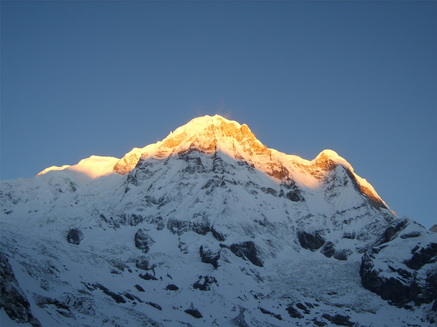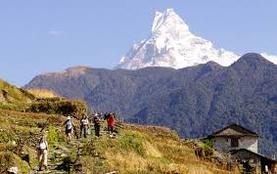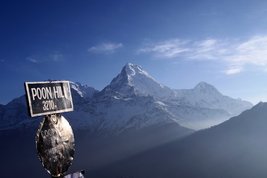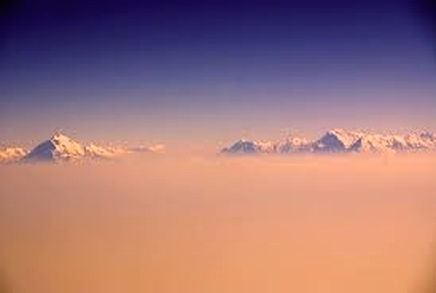2) HIMALAYA
|
“Kathmandu,” I blurt out, suddenly, and rather louder than I had intended.
The travel agent jumps in her seat, startled. She's been tapping her pen impatiently on the desk blotter, and gazing distractedly out the window, as I hesitated. I suspect she’s daydreaming of tropical islands, cocktails with umbrellas, and bronzed natives in lava-lava’s rubbing coconut oil into her back. The more I looked at the list of destinations displayed in large print on the wall above her head, the more the words had pulsated and morphed into clusters of symbols that meant nothing to me. It’s like I’m having a stroke, and the part of my brain that forms letters into words, or the part that connects words to retained pieces of information—geography, climate, culture, history, religion—has gone offline. I'd stepped into the Student Travel Australia office on a whim, urged by an unseen force, as I walked back to my car from a first year physics lecture that'd covered the Second Law of Thermodynamics. Riveting!! As I have no plans to travel, I'm a little surprised to find myself standing here attempting to make a decision about where I am going to travel to, and when I’m going to do it. New York. London. Paris. Berlin. Istanbul. Cape Town. Tokyo. Rio de Janiero. All these exotic sounding destinations hold their own appeal to me for differing reasons; I'm gripped by unfamiliar excitement, so many possible adventures hover invitingly before me. It’s true, I am unhappy in my first year of a four-year Engineering degree that I commenced six months before at my parent’s urging, fuelled by the fact I'd been awarded a scholarship by the Western Australian Public Works Department. The scholarship would cover my university fees and costs, as well as provide me with a small allowance during the four years of the degree at the University of Western Australia. I would then work for the Public Works Department for a number of years afterwards—how many years exactly I can’t remember. It’s also true that my closest friend in the engineering course, Leanne, and I had recently fantasized about taking off traveling, spur-of-the-moment, and abandoning our degrees together. Admittedly we'd been under the influence of excessive cheap red wine at the time, and actually going ahead with this flight-of-fancy idea had not crossed my mind in a sober state until today. Now, unexpectedly, I’m going to Nepal. |
|
Two weeks later, a hastily purchased backpack stuffed with some clothes, a couple of books, and a pack of anti-malarial tablets I don’t know if I need or not, slung over one shoulder, I approach the customs checkpoint at Kathmandu airport.
When I was 16 I'd travelled to Singapore where my high school band had played concerts as part of a cultural exchange. On that trip, however, all of the travel details had been taken care of by our responsible adults. This trip is my first solo expedition outside Australia. Having turned 18 earlier in the year, in my mind I’m an adult. In reality, however, I'm a shy naïve kid who has led a sheltered life of relative privilege growing up in suburban Perth, WA, in the 1960s and '70s. A naïve kid with minimal exposure to the world’s politics, or to religious philosophies. Two uniformed men step in front of me. I assume, incorrectly, that they're Nepalese immigration or customs officials. They indicate in unison—perfectly synchronized machine guns waving like a well-choreographed dance routine—that I should precede them to an unmarked door to my left. As all of my fellow travellers from the flight between Singapore and Kathmandu are currently walking straight ahead and out the main doors of the airport, I'm a little concerned by this turn of events. An unpleasant but familiar wriggling sensation starts in my lower chest and solar plexus. I look for a label for it: apprehension? No. No, it’s definitely fear. The two uniformed men are short for adult males, in fact they are significantly shorter than I am. At this point my mind randomly drags up and presents me with a fact from a 1973 reading of Volume 15 of the Encyclopaedia Britannica, entry on Nepal: “The people of Nepal are short in stature due to the elevation at which they live.” In this moment my mind is unable to make the connection between residential altitude and height so I make a mental note to myself: Research relationship between height and altitude when return to Perth. The room we enter is a tiny cube no greater than two metres in any dimension. There's no furniture, and there are no windows. The word cell flashes across my mind momentarily, but is quickly swept aside by a larger wave of naïveté. At the prompting of my new acquaintances, I drop my backpack lightly to the floor and stand before them trying to look eager to please but also harmless. The machine guns start waving again, this time up and down, pointing from my neck down to my feet; the wriggling sensation in my chest turns to a writhing: that would be terror. Unfamiliar foreign-sounding words—really it’s more like grunting than speaking—accompany the movements this time; I frown. After a few seconds I determine that this combination of gun waving and grunting amounts to instructions that I should remove my clothing. Oh! My goodness! That’s unexpected. “Really? All of it?” I ask the uniformed men, softly. Puzzled expressions in reply of no assistance. My mind is busy desperately trying to reconcile the conflicting emotions of the thrill and sexual excitement of being a young gay man naked in a confined space with two short-but-definitely-handsome military types with guns, versus the shame and terror of being a young gay man naked in a confined space with two short-but-definitely-handsome military types with guns; I undress. The next round of gun waving and grunting takes me a little longer to decipher. I already have hold of my tiny shrunken penis and empty scrotum with my left hand when it started, so, in fact, I was half way there already. “Lift up my penis . . . and . . . and spread my legs?” Oh, OK. That's fine. I gaze up at the ceiling, suddenly fascinated by the branching pattern of small cracks that I can almost touch, close above my head. “Bend over . . . OK . . . and . . . and . . . and what . . . and spread my butt cheeks!?!” Now that took significantly longer. Me, bending over, turning around from time to time and looking up at the two Nepalese soldiers who are still waving their machine guns, wondering if I’m doing what they have asked me to do or not; mortified. Them, bending forward, staring at my exposed ass hole from time to time, chuckling, and wondering what they should ask me to do next. Oh, the shame. Oh, the thrill. Oh, the erection!! |
|
I spend a little over a week in Kathmandu acclimatising to the altitude, and acclimatising to the culture. This is a Buddhist country, I learn. This terminology is foreign to me. I grew up in a disinterested Anglican household in Australia. At 12 years of age I'd actively rejected religion due to the perceived hypocrisy between what I was hearing being preached in church, and what was being practiced in the world around me. At 18, I suppose I’m an atheist, but I'm hedging my bets and standing with both feet in the agnostic camp so as not to seem too radical. To feel the life and energy of a culture that identifies as Buddhist is new for me.
I quickly find that I like the Nepalese people. They're open, friendly, and very helpful. I feel I can trust them, which, given the emotional trauma I have just suffered at the hands of the Nepalese Armed Forces, is a welcome relief. I visit Buddhist temples, and for the first time see and experience meditation. Something about it fascinates me, but as I have no frame of reference to relate it to, the deeper significance goes overlooked . . . for a further 21 years. A hair-raising eight hour bus ride to Pokhara is the next stage of my journey. In reality I have no idea where I’m going. It feels like I am following my nose somehow, sniffing out a scent. When I'd arrived in Nepal a few days before I had no further plans. Getting to Kathmandu was all I'd managed to organize before hurriedly leaving Australia amid cries of protest from my family and the UWA engineering faculty. People I'd met and spoken with in Kathmandu were quite often going to, or coming from, a town in the west of Nepal named Pokhara. Apparently it was a good base for trekking into the Himalaya’s. Oh, that sounds like a fun thing to do. Trekking. Yes, I think I’ll go trekking in the Himalaya’s. Two days later, a trekking permit and a survey map of the Annapurna Region in my backpack, I set out. Am I unprepared? Absolutely. Do I know I'm unprepared? No frigging idea!! |
Trekking the foothills of the Himalaya is actually quite easy if you are young, and/or fit; luckily I'm both. The tracks are well established trails that link villages. The area is reasonably well populated, with villages being separated by no more than a few hours walk. The signposts, and my map, prove to be generally unreliable, but luckily my uncanny sense of direction kicks in. With the fishtailed Machapuchare peak visible from just about everywhere in the region, I manage to find my way without too much difficulty. What is my destination? I’m still not sure. Perhaps someone I pass on the trail can help me?
The Jomsom Trail is a foot track that runs roughly north-south, and which connects Western Nepal to Tibet via a high pass through the main body of the Himalaya mountain range. Close to Pokhara it is relatively busy, with many local Nepalese—often accompanied by mule trains—journeying and transporting goods between parts of this vast inaccessible wilderness. Higher in the Himalaya the Jomsom Trail is seldom trodden and hazardous.
Small teahouses are scattered along the trail for both hikers and local Nepalese to eat at and sleep in. Oh great, there are teahouses to eat at and sleep in, that’s a relief, I think vaguely to myself, as the sun starts to go down on my first day on the trail. The food at the teahouses is cheap and hearty: rice and dhal, rice and dhal, rice and dhal, spinach, rice and dhal, rice and dhal. It’s plain, and not particularly spicy this far north, but it is good energy food which is important given all the walking I’m doing. Along the trail I meet other western trekkers, some solo, some in pairs. A few of the hikers have Sherpa guides, and some have porters carrying their luggage. Generally these trekkers are seasoned travellers. They prove to be great sources of wisdom with respect to practical matters about travelling, world politics, and—most importantly for me—with respect to matters of the esoteric, mystical, and spiritual world.
Here is another first: vibrant, exciting young people talking about God. Well, generally they’re using words other than God—Shiva, Krishna, Vishnu, Brahman, Kali—but there is no doubt that’s what they’re talking about. They speak in ways that sound positive and exciting. As they do so I feel a new sensation, a tingling, running through my body.
"Spirituality? Is that what you keep calling it? And what did you say you were again? Sannyasin?”
Further mental note to self: Look up ‘Spirituality’ and 'Sannyasin' when return to Perth.
The Jomsom Trail is a foot track that runs roughly north-south, and which connects Western Nepal to Tibet via a high pass through the main body of the Himalaya mountain range. Close to Pokhara it is relatively busy, with many local Nepalese—often accompanied by mule trains—journeying and transporting goods between parts of this vast inaccessible wilderness. Higher in the Himalaya the Jomsom Trail is seldom trodden and hazardous.
Small teahouses are scattered along the trail for both hikers and local Nepalese to eat at and sleep in. Oh great, there are teahouses to eat at and sleep in, that’s a relief, I think vaguely to myself, as the sun starts to go down on my first day on the trail. The food at the teahouses is cheap and hearty: rice and dhal, rice and dhal, rice and dhal, spinach, rice and dhal, rice and dhal. It’s plain, and not particularly spicy this far north, but it is good energy food which is important given all the walking I’m doing. Along the trail I meet other western trekkers, some solo, some in pairs. A few of the hikers have Sherpa guides, and some have porters carrying their luggage. Generally these trekkers are seasoned travellers. They prove to be great sources of wisdom with respect to practical matters about travelling, world politics, and—most importantly for me—with respect to matters of the esoteric, mystical, and spiritual world.
Here is another first: vibrant, exciting young people talking about God. Well, generally they’re using words other than God—Shiva, Krishna, Vishnu, Brahman, Kali—but there is no doubt that’s what they’re talking about. They speak in ways that sound positive and exciting. As they do so I feel a new sensation, a tingling, running through my body.
"Spirituality? Is that what you keep calling it? And what did you say you were again? Sannyasin?”
Further mental note to self: Look up ‘Spirituality’ and 'Sannyasin' when return to Perth.
|
Four days later, I wearily drag myself up the last few roughly cut stone steps, and stand on the cliff edge at the summit of Poon Hill. Despite its self-deprecating name, Poon Hill stands at an elevation of a touch over 10,000 feet. Arriving at the summit of Poon Hill this afternoon the view of the surrounding mountains is completely obscured by heavy, hovering mist and cloud; the full majesty of the Annapurna Range, as seen from this well-known viewing point, is yet to be revealed to me.
I don’t know what’s going on . . . but I feel GREAT! Waves of goose bumps course up and down my body; wave after wave of ecstasy. Is it that I just made it to the top of the mountain that I fell like this, or could there be another explanation? Whatever it is, it feels REALLY good. I yell loudly, wave my arms above my head like wind vanes in a gale, and jump up and down like a maniac, “Yeeeeeehhaaaaaaaa!!!” Who would have thought that a state of euphoria was a symptom of altitude sickness? Mine, luckily, is mild. At least that’s what my trekking companion of the day, Gerard—or was it Gerald?—tells me as he shares his sizeable wisdom with me later that night around the large communal fire; the centre of life at the Poon Hill Lodge. I sleep soundly in the lodge that night. This particular lodge is a popular destination with trekkers, and there are fifty or so other bodies sleeping on mattresses on the floor in a big, open, dormitory-style room. Coughing, huffing, jostling, and moaning fill the space around me all through the night. At around 5am my body jerks me awake. It is cold, stiff, and sore. I groan softly, and gently start moving my wrists and ankles in circles, starting to wake my body up. I notice that the kitchen light is on—that means hot water. Excellent. I’ll get up before everyone else and be the first to receive my bucket of hot water to wash with today; I’m not going to miss out again like I did yesterday. Outside the lodge, on the cliff edge, are two shower cubicles: hessian sacking covers three sides of rough wooden frames, the fourth side open towards the east, towards the Annapurna Sanctuary. As I step into my cubicle and start to undress the sky in front of me is just starting to lighten a little. It’s freezing. I shiver, hug myself, and run up and down on the spot to try and warm myself up. The steaming hot water feels wonderful on my skin; I moan with the pleasure of it. I laugh as I think of Leanne back in Perth digesting facts about stresses and strains, concrete and steel, forces and levers. At this moment, the world of an engineering student seems like another life that happened to somebody else. I lather soap on a washcloth and start to wash my body. As I go to wash my back I swivel around instinctively, and . . . I am stopped dead in my tracks. Motionless. Like a statue. My posture and facial expression captured and frozen in stone forever. The sun is just starting to rise on the eastern horizon, opposite where I am standing. A thick uninterrupted layer of cloud is obscuring the direct rays of sunlight. The clouds themselves are starting to glow a deep, rich, shade of pink. They stretch from horizon to horizon, and their texture is like pink cotton candy, lit from below by the light of the rising sun. Protruding through this layer of shimmering iridescent fairy floss are ten or more perfectly formed, snow-capped mountain peaks that are arranged roughly in a circle, my location being the final pillar of this awe-inspiring gathering: the Annapurna Sanctuary. Next, angelic voices all around me start singing: “Hallelujah, Hallelujah, Hallelujah." Well . . . that’s how I remember it, anyway. I may have added that last bit later. My body is bent and immobile. A soapy washcloth is in my left hand. A steaming bucket of hot water is beneath me, swirling mist rising into the air around my legs. I am naked except for a modest covering of soapsuds. A circle of 25,000-plus foot snow-capped mountain peaks are all around me. Then, a voice announces, quite clearly and matter-of-factly, appearing to arise from inside my head, or perhaps just behind me to my left: “BECOME A DOCTOR.” Just three words. I blink a few times, surprised. "Um, are you talking to me?" I say out loud to no one in particular. "YES." “Ah, is . . . is . . . is that why I’m here?” “YES.” nteresting. Next thing I'm weeping, and weeping, and weeping. Tears are streaming down my face. Frozen trails form on my cheeks. Waves of goose bumps, now familiar, course up and down my body. “Beautiful view, isn’t it?” a loud voice booms in my right ear. Irish, my mind responds automatically. Dense curls of dark brown chest hair greet my peripheral visual field as I look to the right. Looking up I see a grinning mouth, full of crooked teeth, and a face, full of joy. “Gerard”—or was it Gerald?—"Hi. How are you?" He points, superfluously, towards the astonishing vista that has unfolded in front of the bathing cubicles: "Niiiiiiiiicccce." My body is stiff and frozen. The bucket of water beneath me is icy cold. I look slowly back around to my left and take it all in. As I do so I notice that the tingling I'd experienced when talking with my fellow travellers on the trail is back. This time it has merged with the goose bumps . . . and is feeling quite pleasurable. It feels like pure joy, pure excitement, and pure potential, all mixed together. Every cell in my body—despite the intense cold—feels vibrantly alive, like they have never felt before. OK. Right then. Let’s do this . . . Angel Stevie Paris, November 29th, 2014. I went trekking in Nepal in August 1982. Listen to Himalaya, the song I wrote about it. |




